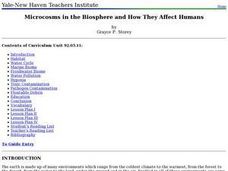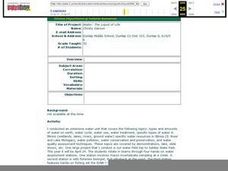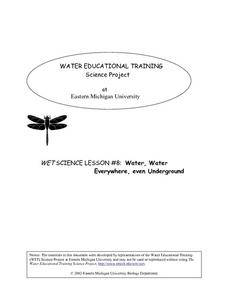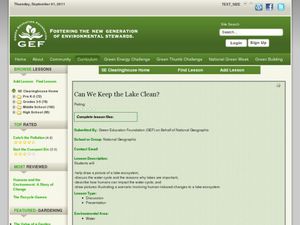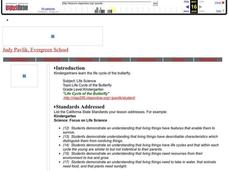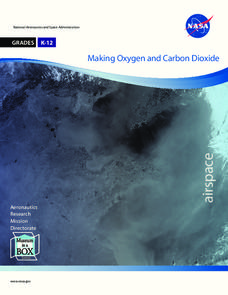Curated OER
The Spider's Life Cycle
Students see that spiders have a life cycle, and reproduce by laying many eggs. We can count by ones, twos, fives, or as many as we want. They make two lists of animals on a chart.
Curated OER
Water Water Water - Costume Designing
Young scholars create costumes using recycled materials determined beforehand by the teacher in this High School Drama/Art lesson on costume designing. The example lesson is based around the title of "Water, Water, Water" but can be...
Curated OER
Science: Microcosms in the Biosphere
In a series of lessons, examine the impact on humans by microcosms in the biosphere. Among the plans structured for learners with different abilities and learning styles, are activities describing the symbiotic relationship, drawing the...
Teach Engineering
Weather Basics
Weather — there's more to it than meets the eye of the storm. With this resource young meteorologists learn about the basics of weather, including information about the factors that influence the weather, common weather vocabulary, and...
Curated OER
Using Details From The Text
Begin this expository writing activity by reading a non-fiction book of your choice and modeling expository writing. The plan suggests The Trip of a Drip by Vicki Cobb but notes that other texts will work. Learners then choose a...
Curated OER
Recycled Water?
Students participate in a hands-on activity to investigate how water is recycled in a small environment, and determine how water is cycled on earth.
Curated OER
Investigating Earth's Materials
First graders compare and contrast water from different sources. After collecting water from various sources, 1st graders create a list of observable properties of the water. Students then pour the water into a filter and observe the...
Curated OER
Water: The Liquid of Life
Sixth graders complete a lesson on the properties, types and amounts of water on Earth. In groups, they travel between stations to identify water resources in Illinois and pollution sources. They complete the lesson with a field trip...
Curated OER
Butterfly Lifecycle
First graders examine diagrams of butterflies printed from the stated website and follow directions to make a model of the butterly life cycle. They then participate in a WebQuest to observe the life cycle stages of a butterfly.
Curated OER
Water Quality
In this unit of lessons, 2nd graders examine the water quality of the water on the planet. They discover how much water is on the planet and how to conserve their water usage.
Curated OER
Water Conservation
Students create short videos about water conservation using the computer program iMovie in this cross-curricular lesson provided by the Florida Center for Instructional Technology.
Curated OER
Water, Water Everywhere, Even Underground
The "Engage" section of a wetlands lesson plan asks young ecologists to examine a wetlands poster. You can easily find one online and display it using a projector. Pupils immerse a piece of sandstone and a piece of granite in water to...
Curated OER
Can We Keep the Lake Clean?
Learners are introduced to the water cycle. They help draw a picture of a lake ecosystem, adding human impacts that affect water quality. Students help fill in the components of a drawing of a water system. At the end of the...
Curated OER
Life Cycle of the Butterfly
Students listen a variety of books on butterflies and are introduced to their life cycle. In groups, they describe the life cycle in the correct order and watch the life cycle from larva to the butterfly in a demonstration. To end the...
Curated OER
Life Cycle of a Frog
Students observe the life cycle of a frog. In this life cycle lesson, students will observe and record the changes in the life cycle of a frog.
Curated OER
Erosion And the Cycling of Rocks And Minerals
Students investigate the concept of erosion by water in a problem solving activity. In small groups, they are assigned either sand, potting soil or rocks to construct a mountain that will hold up to a sprinkler can of water dripping on...
Curated OER
Critters of the Water
Young scholars examine different organisms in various marine habitats. They identify any adaptations that have allowed the organisms to survive. They develop an imaginary organism and describe its life cycle.
Curated OER
Water Taste Test
Young scholars brainstorm the different characteristics of potable water. In this general science lesson plan, students test several water samples and hypothesize which samples and brands they are. They discuss where drinking water came...
Curated OER
Final Project Presentations: Water Quality
Learners synthesize the information they have been researching on water quality to evaluate the potential health risks in a region with arsenic contamination. They prepare and present a persuasive speech that incorporates visuals.
Curated OER
Intermediate Activity: Energy Guide Labels
High schoolers explore energy efficient appliances. In this economics and ecology lesson, students compare and analyze EnergyGuide labels of various appliances. High schoolers discuss federal government involvement with consumer...
Curated OER
Exercise and Water
Second graders discover the needs of their body by trying different types of aerobic exercise. In this physical education lesson plan, 2nd graders analyze The Busy Body Book by glancing at the pictures inside and predicting what the...
NASA
Making Oxygen and Carbon Dioxide
Some like it hot! Scholars observe both exothermic and endothermic reactions as part of the carbon dioxide oxygen cycle. First, scientists demonstrate (or watch) a chemical reaction to create pure oxygen using fire for confirmation....
Baylor College
Needs of Plants
What better way to learn about plant life than by creating a class garden? Young botanists start with a brief discussion about radishes before planting seeds and watching them grow. To determine the importance of water, sunlight, and...
Tech Museum of Innovation
Seed Dispersal
Engineering challenges are not just man-made ... nature has its own set of them. A hands-on STEM activity has groups designing a seed dispersal system. Each group can only use one sheet of paper — a tough task!




